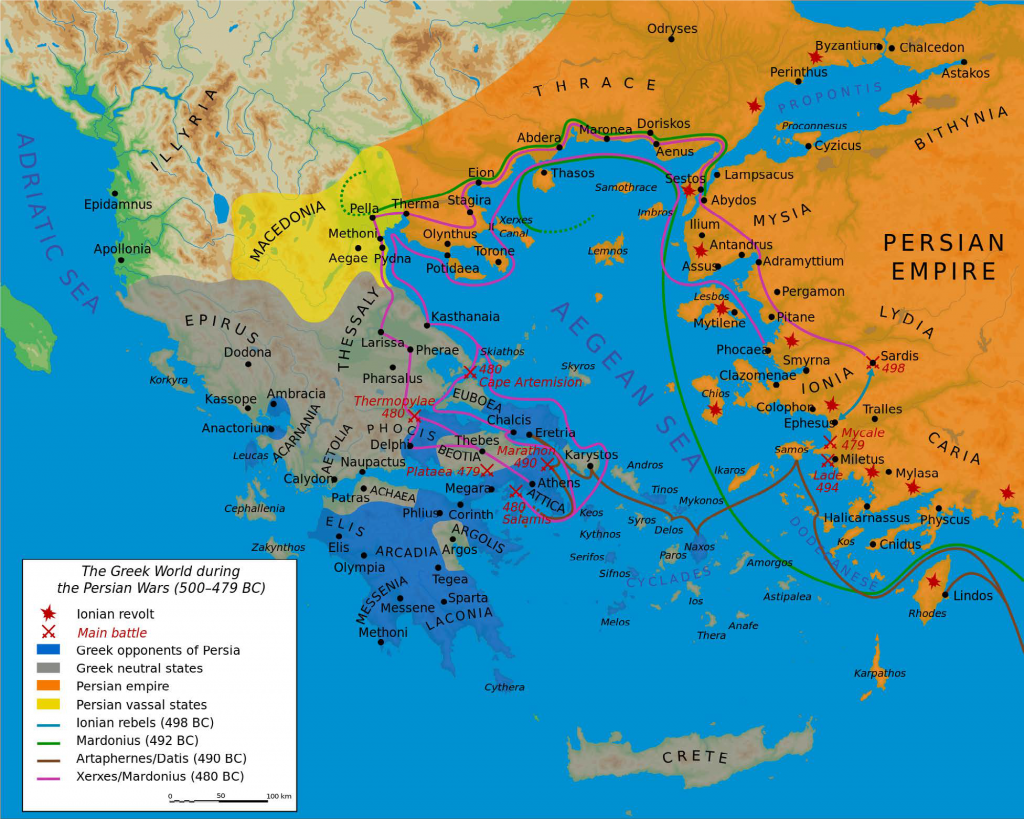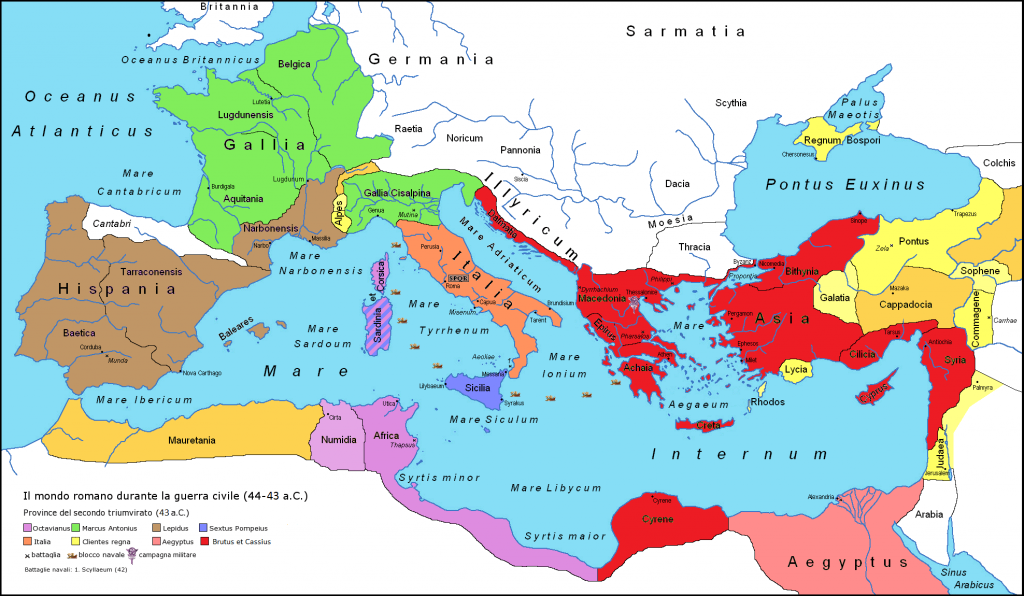peter
Introduction
When we talk about the origin of the Western Culture, we would mention the Greece and Rome. They both have their own characteristics. Greece developed a city-state system and there were lots of states in the Greece area. Greece also gave brith the first democracy country, Athens. Rome dominated the Mediterranean sea before 145 B.C. They both have their special polity so that they became great power.
The origin of Greece polis institution
Before we think about the origin of the Greece polis, we should take a glance of the geography. This is the map of Greece:

Greece area has it own special environment. There are lots of island in Aegean sea. Greeks lived on those island and the seashore of Balkan peninsula. It would be hard to build a concentrated cultivation and form a large communal living community, but this provided a perfect commercial environment. Greece polis would exchange good with other polis, especially places where were lack of a specific kind of good that elsewhere are producing.
Greeks were particularly advocated the polis form and they quite paid attention to politics. Once there was a famous poet said: political society is the essence of good life. Aristotle said: Man, as a Greek word, are political zoon. A men who is by nature without a polis is either more or less than a man. That prove the polis is the most appropriate for man in Aristotle’s thoughts. They think only people live in polis were civilized.
Most of polis have a consul(except Sparta), they were constituted by election. Polis were small state with small quantity of population. Athens, the one of polis, reformed to democracy and became prosper.
Athens democracy
Athens was originally the name of a city on the Attica Peninsula. After attica was unified as a city-state, it became the name of the country. Athens faced three seas, had little terrain, plain and hilly land, which was not convenient for the development of farming and animal husbandry, and had good shipping conditions.
In 594 BC, Solon was elected as the consul of the Athenian polis, and began a series of economic, political and social reforms with constitutional significance:
All debts owed by Athenian citizens as security against the person shall be abolished
A series of pro-business policy measures, including restricting food exports and expanding olive oil exports; Currency reform to facilitate trade and commerce; To reward the immigrants of craftsmen and encourage citizens to learn handicraft skills.
Abolishing the monopoly of the hereditary aristocracy, and no longer classifying citizens by birth but by the quantity of their property
A council of four hundred persons was established as a permanent body of the General Assembly of citizens and as the highest administrative organ.
After the reform, Athens enjoyed the prosperity and got developed. Athens rose to dominate the Greek region. After that, they allied to others states and defeated the strong Persian army.
Rome’s special polity
Before Rome started war and dominated the Sea, Rome was a small state at Apennines peninsula. At 5 century B.C. Rome started war with its neighbor and finally dominated the Italy, Iberia, North Africa, France, Greece and part of Britain. Historian had proved that those result are depending Rome’s polity, to a great extent.
Ancient Rome have three politic stage, Monarchy, Republic and Empire. Stage Republic and Stage Empire are worthy to study. Rome Republic, is kind of a mixed government. There is not any absolute power rule. Different apartment balance different apartment and the country take advantage from those different parties.
Noticeable, the Modern American polity is quite similar to Ancient Rome polity. Furthermore, American polity is inspired by Rome polity because it is so good. Rome have a name SPQR, that is Senatus Populusque Romanus(Senate Population Romans).
The Roman Political system was basically divided into three main elements such as the Senate, the Magistrates and the Assemblies. The senate was politically important because it is the center point for political discussion. The Senate mainly managed the advisory powers. Secondly, the administrative and executive powers lie with the magistrates. In addition, they are also responsible for serving as judges and initiating legislation. Thirdly, in the assemblies; people passed bills, elect the magistrates and served various judicial functions.
This kind of structure have some several advantages. First, Consuls could make decision efficient and effectively; Second, Senate have many Elite and Noble, their collaboration could help making decision more suitable; Third, Consuls elected by people, those people are the representative of the country, so bring with their thoughts into the process of making policy, it would be more suitable and accessible.
Republic of Rome to Roman Empire
Depends on the Roman strong army and enlightened politics, the republic of Rome gradually captured the whole Mediterranean Sea. But there comes to another problem: How to manage those people?
When Rome was just a state, they could control the power and make the country easily. They built a special but strong polity to maintain domestic stability. When they started the war, they encouraged soldiers, when they conquer an area, those land and people belong to them. It brought treasure and population to Rome and guaranteed the loyalty of troops.
So they dominated the whole Mediterranean Sea, they took a glimpse. North, are savage German’s land; South, is the Sahara Desert; East, is Arabic Desert and it was too difficult to control the Mesopotamia because it was too far from the Roman dominions, those land are useless and infertile; West, is the endless Atlantic and Britain area. Rome is not possible to explore Africa and America at that time. And England island was infertile too because Britain was full of bogs in that period.

After the Fourth Macedonian War, Rome gradually stopped the conquest. The Republic of Rome experienced a economic developing period. But social contradiction were intensified.
First, the prosperity if Republic of Rome was depending on military force, there were lots of soldiers in Republic of Rome(they are civilian, not slave). When for expanding constantly, a large number of new slave constantly nourished the Roman land wealth, wealth while in concentration, but also can take out of the interests of the small scale to meet the needs of the civilians, so the contradiction can be in developing cover, if the soldiers complain about the unfair distribution in this war, then another war again robbing a batch of goods to appease everybody.
Now solider could not get benefit because of end of wars. For the soilders, it is not like modern society. They joined troops because glory and trophies but the governance will not pay for them. There were displease because soldier is a useless job and the treasure into the pockets of the nobility. Besides, most of those who went to war as soldiers were economically crippled by a chronic lack of labor in their families, and the influx of slaves made them jobless proles. They took off their uniforms and went home, but they still had a hard time.
Second, land annexation and the gap between the rich and the poor are becoming more and more serious. A small number of slave owners controlled most of the land and wealth. Family farms disappeared in the countryside and villages declined, replaced by estates of big slave owners. The fundamental of Republic is depending on small peasant economy. Relatively independent farms, there is no monopoly and that is the core of republic. But the increasing power of noble and slave owner made the governance more inclined to those people. Obviously, republic is no longer fit to this situation. That is a deep reason that Roman Republic changed to Roman Empire.
Land annexation made lots of civilian lost their jobs. Those unpleasant solider, because they went out for long time, their family cannot manage those land because of lack of labour. The noble and nobility occupied those land, some people even got into serious debt. Many people who join the army are not as good as before or even extremely poor. At the same time, the gap between the rich and the poor make it more and more serious and make people have worse life.
Third, large numbers of civilian lost their land and their jobs and became proletarians. They are useless and only have a vote. Displaced freemen had to go to the cities to beg for food in addition to serving as soldiers. After all, they still had votes and the state provided them with food and entertainment. Those people were doing nothing all day, go to the Colosseum to paralyze himself and watch some boring fights. Many Romans fall and became entirely useless. Under Caesar (around 40BC), at least 300,000 people were on state handouts in Rome.
Fourth, slave cannot bear the exploitation from their lord. So they started the revolution. From the 230’s to the 130’s, the era of the civil war, the Sicilian slave revolt, the struggle between the bankrupt peasants and the big landowners started. Most historians believe that extreme oppression and a yawning gap between rich and poor led to the uprising.
The decline of the soldiers, the serious land annexation wealth gap, the bankruptcy and degradation of the civilian and the slave revolt finally cause the changes of Rome. In 27 BC, Octavian used his political skills to announce that he would remove all power and restore the Republic. At the same time, he pretended to be the chief senator at the request of the Senate and the citizens, accepting absolute power totally contrary to the Republican system. Since that, era of Republic of Rome ended, era of Roman Empire started.
Roman Empire
There comes to Roman’s empire age. The Prince system was implemented in the early period of the Empire, and the Domina system was implemented in the later period. Principatus is generally called the system of heads of state. It still retains the General Assembly and the Senate of the Republic, but the functions of these national institutions have been greatly weakened. The imperial heads have a military, administrative and religious power in one and can continue to be re-elected to become The emperor in substance. It can be said that the Prince system is a transitional stage from the republic to the monarch. It implements the monarchy in the name of the republic. The Prince system greatly strengthened the centralization of power and consolidated the personal power of the monarch, so that the head of state could effectively control the Roman Empire that was determined at the beginning of the civil war and had a wide territory. Facts have proved that such a political system is effective. It has ensured the peace of the Roman Empire for more than two hundred years, created conditions for the early social development of the empire, and gradually romanized the provinces in the empire.
Work Cited